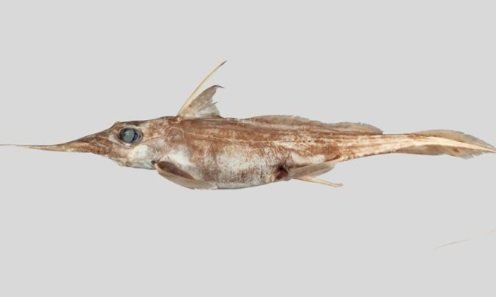
In a remarkable scientific breakthrough, researchers in New Zealand have discovered a new species of ghost shark, an elusive deep-sea fish that inhabits the depths of the Pacific Ocean. This discovery not only expands our understanding of marine biodiversity but also sheds light on a species that has remained largely unknown due to its remote habitat.
What Are Ghost Sharks?
Ghost sharks, also known as spookfish or chimeras, are unique creatures related to sharks and rays. Unlike typical fish, they possess skeletons made of cartilage instead of bone and are devoid of scales. These ancient fish are fascinating due to their evolutionary lineage, dating back nearly 400 million years, making them distant relatives of modern sharks and rays.
Where Was the New Species Found?
The newly identified species, named Harriota avia or the Australasian Narrow-nosed Spookfish, was discovered at Chatham Rise, a deep-sea region east of New Zealand. Ghost sharks are known to reside in extreme depths, sometimes as deep as 2,600 meters (1.6 miles), which makes them incredibly difficult to study. The vast and inhospitable environments they inhabit have kept much of their biology a mystery until now.
Significance of the Discovery
Dr. Brit Finucci, one of the lead researchers on the project, emphasized the importance of this discovery. “Ghost sharks are incredibly rare and hard to find, and we know so little about them,” she explained. “Every discovery like this brings us one step closer to understanding these deep-sea creatures and their role in the ecosystem.” Given the fragile nature of marine biodiversity, understanding more about such species is essential for their conservation and protection.
Naming the New Species
The name Harriota avia holds a special significance. It was chosen in honor of Dr. Finucci’s grandmother and also serves as a nod to the ancient history of chimeras, which have roamed the oceans for hundreds of millions of years. The ghost shark’s name not only reflects its personal connection but also highlights its evolutionary heritage.
What Makes This Species Unique?
Initially, scientists believed this new ghost shark was part of a widely distributed species. However, genetic testing revealed that Harriota avia is genetically distinct, specific to the waters around Australia and New Zealand. This discovery underscores the importance of studying the genetic makeup of marine species, as it helps distinguish unique populations and informs conservation strategies.
Importance of Conservation
Studying ghost sharks is critical for conservation efforts, particularly because they inhabit such deep and isolated parts of the ocean. With their populations still largely unquantified, it is difficult to assess the risks they face. By learning more about their biology and genetic diversity, scientists can develop strategies to protect these ancient creatures from threats like deep-sea fishing and habitat disruption.
The discovery of Harriota avia marks a significant milestone in deep-sea research, offering new insights into a world that remains largely unexplored. As scientists continue to study these rare and enigmatic species, their findings will play a crucial role in ensuring the protection of these deep-sea dwellers and the ecosystems they inhabit.

